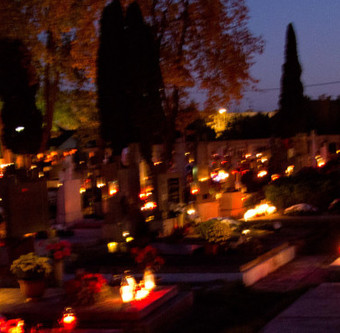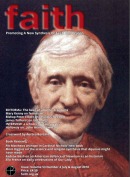
Life, dignity, and eternity
Article:
01.07.18
James Tolhurst looks at what we mean by “dying well”
It has been said that of the two certainties in life, death and taxes, only the first is never to be mentioned at the dinner table. We shroud death with all sorts of euphemisms which serve to divert attention from the reality.
Yet death is the one thing that we can be sure of. It is true that “Death is certain: the time and manner are uncertain. Whether by a long disease or by some unexpected accident.”
That prayer expresses the sentiments of the Confraternity of Bona Mors (the Society for Happy Death) founded by Fr.Vincent Caraffa SJ in Rome in 1648. It was a time when the world was continually ravaged by cholera, typhoid and plague and death was a familiar experience for most families. There was also capital punishment. An essential part of priestly work is and was consoling the dying and the bereaved but Fr. Caraffa felt that there was a need of a society to prepare for death : learn every day the art of dying well.
A bi-product of our healthy living, combined with growing disbelief pushes the idea of death into the background because we are like the rich merchant in the parable who said to his soul, “You have ample goods laid up for many years, eat, drink, be merry.” He was called a fool, for “so is he who lays up treasure for himself , and is not rich toward God.” (Luke 12:18ff).
We can put off the prospect by relying on opiates to induce a state of euphoria to take away the fear, and hope that we can be admitted to a Hospice. But nothing can take away the impact of death when we are made to face the truth – for doctors are forbidden to use euphemisms any more.
Suicide
So, there is Dignitas. Assisted suicide at a centre in Switzerland, guaranteed to have you depart this life at a time and place of your own choosing. Marketed as a tidy, modern way of departing this life.
It has a growing subscription list of people willing to pay upwards of £8000 for the complete package, which includes the one way ticket to a flat in Zurich. It is seen as a relatively clean alternative to hanging oneself or throwing yourself in front of a train. But however you look, whether with the assistance of a doctor or administering Nembutal to yourself, it is suicide. We can ask why this has become one of the main causes of death among us (every 94 minutes a day; and the highest proportion among the young) and see it as the result of the rise of personalist ethics. St. John Paul II has drawn attention to the growth of proportionalism and consequentialism with the former “focussing rather on the proportion acknowledged between the good and bad effects of that choice” and the latter “on the rightness of a given way of acting solely from a calculation of foreseeable consequences deriving from a given choice.” Either way it is one’s personal conscience finding excuses to justify one’s choice: ‘I am the complete master of my fate’. Yet St. Paul would say in his love, God “gives to all men life and breath and everything” (Acts 17:25). At the very depths of our being divine power is continually at work, answering our cries of anguish, the same Pope reminds us.
Reverence
But just as our reverence for that gift of life is not something selfish, to be disposed of like rubbish, when we get tired of it, so we must consider how our life affects others. We have obligations to friend and family and to society in general (cf. Catechism of the Catholic Church nn. 2281.2325). Our actions always have an impact – for good and for evil, and “the evil that men do lives after....”
Faced with the growing attraction of suicide, we need to promote the idea of death as something we should be prepared for. We should have a certain honesty, for in a true sense we are hurrying towards eternity. St Richard Gwyn would say on the eve of his execution, “I do but pay the rent before the rent-day”. St Thomas More said to the Duke of Norfolk on Tower Green, “The only difference between you and me, my friend, is that whereas I will die today, you will die tomorrow.” St Teresa of Avila would say, “My Lord, it is time now for us to be together; now is the time to go.” Perhaps it is only the greatest of martyrs and saints that have that equanimity, but there should be a calm acceptance which includes suffering, at the heart of our Christian faith. We should be inspired by the end-of-life example of St John Paul. We need to bear in mind what Our Lord told his apostles as his life was coming to an end, “In my Father’s house are many rooms; if it were not so, would I have told you that I go to prepare a place for you ?” (John 14:2). We should want our death to be like that of the patriarch Jacob when he was reunited with his son Joseph, “Now shall I die with joy because I have seen your face” (Gen. 46:30).
There is also the fact that the priest who attends a dying person bestows the sacrament of the anointing of the sick but has in addition the solemn privilege of saying these words, “In virtue of the faculty given me by the Apostolic See I grant you a plenary indulgence and full remission of all your sins.” He also says this commendation, “Go forth, Christian soul, out of this world, in the name of God the Father Almighty who created you; in the name of Jesus Christ the Son of the living God, who suffered for you; in the name of the Holy Spirit who was poured out upon you. Go forth, faithful Christian. May you live in peace this day, may your home be with God, with Mary, the virgin Mother of God, with Joseph, and all the angels and saints. May peace be yours this day and your home in holy Sion.”
Prepare
The Confraternity of Bona Mors was designed to prepare people beforehand for their death. St. Gregory Nazianzen expressed this perfectly, “Take us also to yourself in your own good time, once our allotted span of life has been completed. May the fear of the Lord make us prepared and yet unperturbed, so that at our death we shall not be drawing back and loath to depart, not dragged and torn from this life as men enthralled by the world and the flesh, but rather going out readily to the life of eternal happiness in Christ Jesus.” (Oratio 7,24) St Ambrose would say the same, “Do not be afraid of the word death: rather in the blessings which follow a happy death. What is death after all but the burial of vice and the flowering of goodness ?” (On the Blessing of Death ch. 4,15). But because the time of death is uncertain, we ought to live a life worthy of immortality. It has been said “Live as you intend to die, for you will die as you live; for death is often nearer than you imagine.” It is salutary for us to have a fear of leading a sinful life, instead of regarding heaven or even purgatory as a human right. Apart from being part of our Christian faith, it will make us conscious of our own unworthiness and a reminder to live for that moment when we will meet the Lord who is also our judge.
Immortality
We should not run away from the idea of dying but rather cultivate a supernatural attitude, thinking of the immortality which follows and ready for “every manifestation of God’s will; freed from the terror of death. For what man who lives in a foreign country would not hurry to return home ?” (St Cyprian On Mortality 18,4) St John Paul in one of his last statements said, “Death has revealed that there is a beyond, that there is a life in this land which is unexplored by man called eternity.” (Letter to the Aged n..15, 1 October 1999).
In Poland there is the ceremony of putting a veil on the dead person, with the words, “Lord and Father, may he/she now behold you face to face: having departed this life, may their face contemplate your beauty.”
Wisdom from St Thomas More
But joined to this we ought to think in terms of uniting our death to God in the same way we offer each day to him. St Alphonsus Liguori, the founder of the Redemptorists, says, “those who offer their death to God make the most perfect act of divine love possible, because by cheerfully accepting the kind of death which God is pleased to send them, when and how God sends it, they are just like the holy martyrs who died for the sake of the faith and out of love for Jesus. So then, let us live our life only to advance in divine love. The level of our love for God at the time of our death will be the level our love for him throughout our happy eternity.” St Thomas More would pray, “God, grant me the ardent desire to be near you; not to be free from the miseries of this sad world...nor for my own profit, but simply and solely for the love of you.” So let us learn every day the art of dying well : Bona Mors.
Notes:
Fr. James Tolhurst is a priest of the diocese of Southwark and has worked as a parish priest and as a hospital chaplain
The admonitions of Bona Mors formed part of Night Prayers at his Jesuit school.





